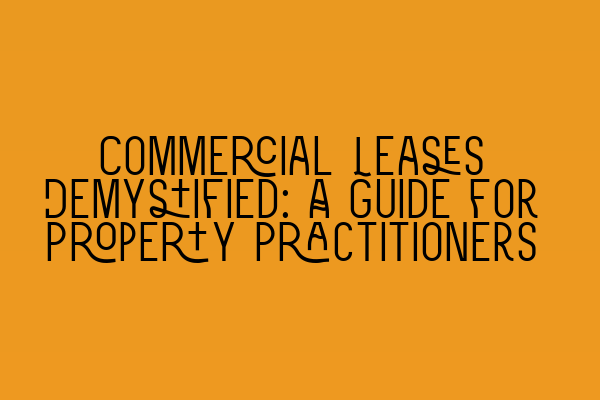Commercial Leases Demystified: A Guide for Property Practitioners
As a property practitioner, understanding the intricacies of commercial leases is vital to providing effective legal advice and representation to your clients. Commercial leases are a complex area of property law that requires a comprehensive understanding of both the legal framework and the practical considerations involved.
In this article, we will demystify commercial leases and provide you with a comprehensive guide to navigating the intricacies of this area of law. Whether you are a seasoned practitioner looking to brush up on your knowledge or a newly qualified solicitor seeking guidance, this guide will equip you with the essential knowledge to confidently handle commercial lease matters.
Key Concepts in Commercial Leases
Before diving into the specifics, let’s begin by outlining some key concepts that underpin commercial leases. Understanding these concepts will provide a solid foundation for delving into the intricacies of commercial leases.
Definition
A commercial lease is a legally binding contract between a landlord and a tenant for the rental of commercial property. Commercial property includes a range of premises such as shops, offices, warehouses, and industrial units.
Unlike residential leases governed by specific legislation, such as the Landlord and Tenant Act 1985, commercial leases are primarily governed by the terms of the lease agreement.
Term
The term of a commercial lease refers to the duration of the lease agreement. It specifies the start and end dates of the lease. It is essential to carefully consider the term of a commercial lease as it affects the rights and obligations of both the landlord and the tenant.
A short-term lease typically lasts for a few years, while a long-term lease can extend to several decades. The length of the term will depend on various factors, including the nature of the business, market conditions, and the preferences of the parties involved.
Rent and Service Charges
Rent is the regular payment made by the tenant to the landlord in exchange for the use of the commercial property. The amount of rent may be fixed for the duration of the lease or subject to regular reviews, typically every few years.
Service charges refer to additional costs incurred by the landlord for the maintenance and management of the commercial property. These charges may cover services such as cleaning, security, and repairs.
It is crucial to clearly define the terms of rent and service charges in the lease agreement to avoid disputes and ensure transparency between the parties.
Use and Alienation
The use clause in a commercial lease outlines the permitted activities that the tenant can carry out on the premises. It is essential to ensure that the use clause aligns with the tenant’s intended use to prevent any potential breach of the lease agreement.
Alienation refers to the tenant’s ability to transfer their lease to another party. This can be through assignment, where the tenant transfers the entire lease, or subletting, where the tenant leases part of the premises to another party.
The terms governing alienation are crucial in commercial leases, as they impact the tenant’s ability to exit the lease and the landlord’s control over who occupies their property.
Negotiating a Commercial Lease
When negotiating a commercial lease, it is vital to have a comprehensive understanding of the key terms and their implications. Here are some essential considerations for property practitioners:
Rent Review
Rent review clauses outline how the rent will be adjusted during the term of the lease. These clauses can provide for reviews at fixed intervals or linked to specific factors, such as market conditions or changes in the Consumer Price Index (CPI).
As a property practitioner, it is crucial to advise your clients on the potential impact of rent reviews and their implications for both the landlord and the tenant.
Break Clauses
Break clauses allow either the landlord or the tenant to terminate the lease before the end of the term. These clauses provide flexibility to parties who may need to exit the lease under certain circumstances.
Understanding the conditions and mechanics of break clauses is essential to ensure compliance with the lease terms and minimize potential disputes.
Repair and Dilapidations
Commercial leases often contain provisions regarding the repair and maintenance of the premises. These provisions outline the respective responsibilities of the landlord and the tenant for the upkeep of the property.
Dilapidations refer to breaches of repair obligations by the tenant. Property practitioners should advise their clients on the implications of repair and dilapidations provisions, including potential liability and cost implications.
Enforcing Commercial Leases
As a property practitioner representing either the landlord or the tenant, you may find yourself involved in enforcing the terms of a commercial lease. Here are some key considerations:
Forfeiture
Forfeiture is the right of the landlord to terminate the lease and regain possession of the property due to the tenant’s breach of the lease terms. Property practitioners should understand the legal requirements and procedures involved in exercising forfeiture rights to protect their clients’ interests.
Rent Arrears and Service Charge Recovery
When tenants fall into rent arrears or fail to pay service charges, property practitioners play a critical role in recovering the outstanding amounts. Understanding the relevant legislation and legal procedures is essential for effectively pursuing arrears and ensuring compliance with the lease terms.
Conclusion
Commercial leases can be complex and nuanced, requiring property practitioners to have a comprehensive understanding of the legal framework and practical considerations involved. This guide has provided an overview of key concepts, negotiation considerations, and enforcement procedures, equipping you with the knowledge to handle commercial lease matters effectively.
For further resources and guidance on property law and the Solicitors Qualifying Examination (SQE), check out our related articles:
